Blog
Be Careful of the Novel Coronavirus
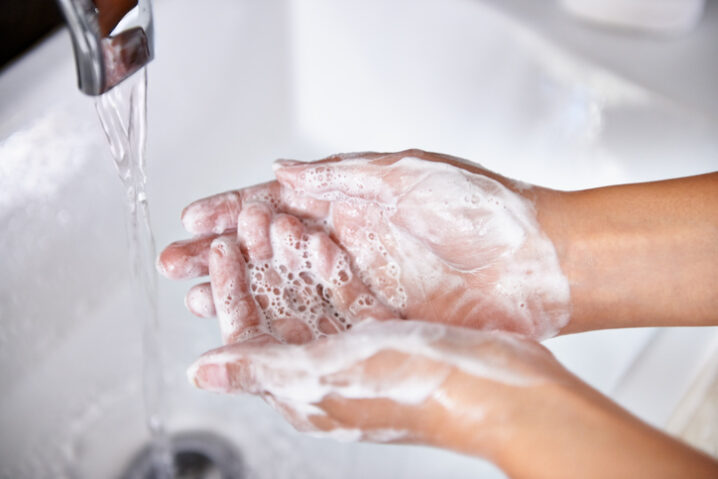
After the ashfall due to the Taal which shook the Filipinos this January, comes another cause for concern: the coronavirus. To help raise awareness about this, we will share to you some information about coronavirus, how to take care of yourself and recent updates as of this writing.
We encourage you to read more and inform yourself about this! Be sure to get information only on trusted websites to prevent misinformation. In this blog post, the information is from the website of the World Health Organization International.
The Coronavirus
Coronavirus in itself is not new. Basically, coronavirus is a family of viruses that are known to cause illnesses in mammals and birds. They are known to be “zoonotic,” meaning they are transmitted between animals and people. It often causes respiratory illnesses.
You might also remember the previous cases of coronavirus disease outbreaks such as the Severe Acute Respiratory Syndrom (SARS) which was first reported in Asia back in 2002, and the Middle East Respiratory Syndrome (MERS) which was first reported in Saudi Arabia in 2012.
What about the 2019-nCoV?
2019-nCoV was the temporary name given to the new virus which stands for Novel Coronavirus. The term “novel” indicates that it is a new strain of the virus that has not been identified in humans previously.
As of January 30, 2020, there are a total of 7,818 confirmed cases of 2019-nCoV across the globe.
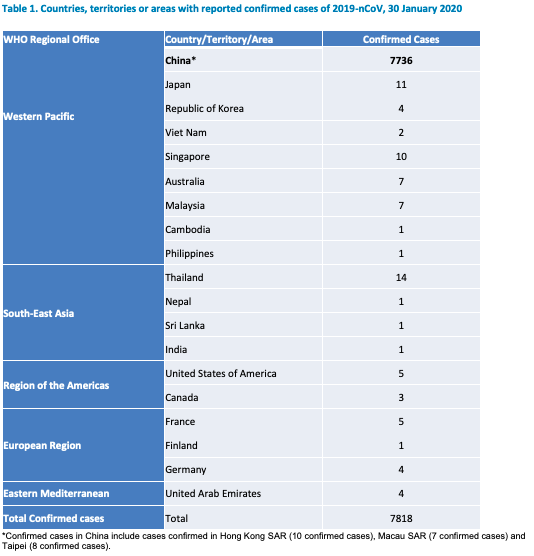
Confirmed cases of 2019-nCoV as of Jan 30, 2020 according to the World Health Organization Situation Report
Continuous research and monitoring is done by public health professionals in order to identify preventive measures and cures.
How can I become infected with novel coronavirus?
To become infected with any coronavirus, you have to come in contact with it. This can be through respiratory secretions meaning a cough or a sneeze, having physical contact with a person infected or touching anything that the virus is on and then touching your nose or mouth without washing your hands. This was also the case during previous outbreaks such as MERS and SARS.
What are the symptoms?
Once your body senses that the virus is destroying cells, it will trigger an immune response which results in the following symptoms:
1. Respiratory symptoms
2. Fever
3. Cough
4. Shortness of breath
5. Breathing difficulty
Since these are also common symptoms that we feel especially during flu season, having these doesn’t necessarily mean you have 2019-nCoV. Laboratory tests, blood work and blood tests would need to be done in order to confirm infection.
How can you protect yourself and others from the coronavirus?
A healthy individual with a strong immune system should be able to fight off the virus similar to when we have flu. The problem lies when the person’s immune system is weak due to illnesses or just bad diet and lifestyle habits. This is why most people who are more vulnerable to becoming severely ill are older people or very young children along with those who have underlying illnesses such as asthma, diabetes or heart diseases.
WHO recommends the general public to practice proper hand and respiratory hygiene along with safe food practices. Some of these are not only applicable to avoid coronavirus but also helpful to practice daily to avoid other diseases.
1. Wash your hands!
Remember to regularly wash your hands using alcohol-based hand rub or soap and water especially after coughing or sneezing, caring for the sick, preparing food, before eating, after using the toilet, or after handling animals or animal waste.
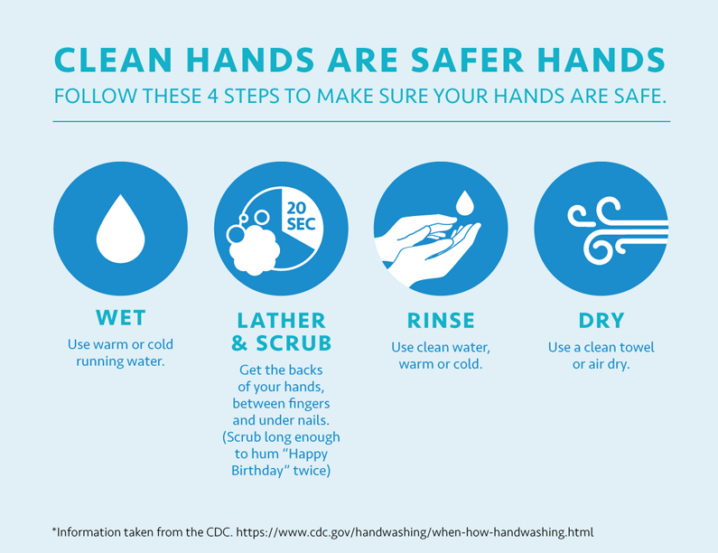
2. Don’t spread the germs!
Always cover your mouth and nose when coughing or sneezing with flexed elbow or tissue. Make sure to throw the tissue away and immediately wash hands. Avoid touching one’s eyes, nose or mouth especially those who are sick or lives with a farm or wild animal.
3. Wearing masks is not enough!
Wear a face mask and be sure to cover the mouth and nose. However, wearing a mask alone is not enough protection. It must be combined with proper hygiene. Avoid touching the mask once it’s on and do not reuse the single-use masks. Immediately throw them away.
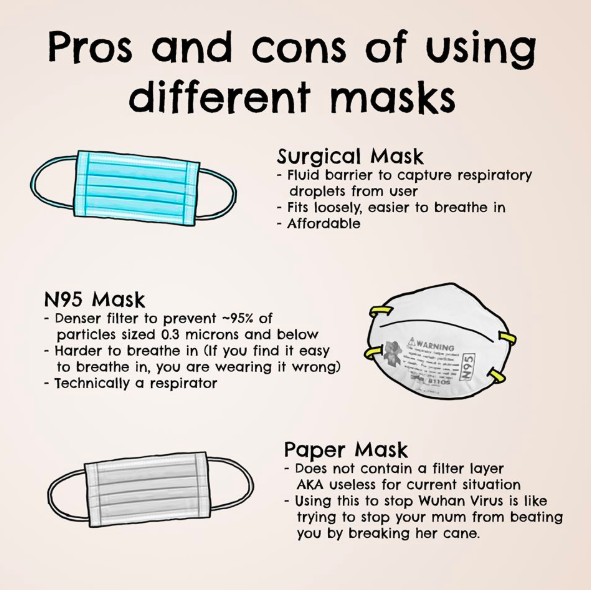
(Different types of mask source: Just Keep Thinking Facebook Page)
4. Practice food safety!
Do not consume raw meat, milk or animal organs. Eating meat products from areas experiencing outbreaks are safe to consume as long as they are cooked thoroughly and properly handled during cooking. Of course, it should be common sense but sick animals or animals that have died from diseases should never be eaten!
Avoid cross-contamination of uncooked food with cooked food when preparing meals. Use different chopping boards for different food items as well.
5. Travel safe!
As much as possible, avoid traveling if you have a fever and cough. If you are feeling well, avoid close contact with those who have fever and cough. It is best to avoid crowded places, too.
6. Boost your immunity!
Always drink lots of water and take multivitamins.
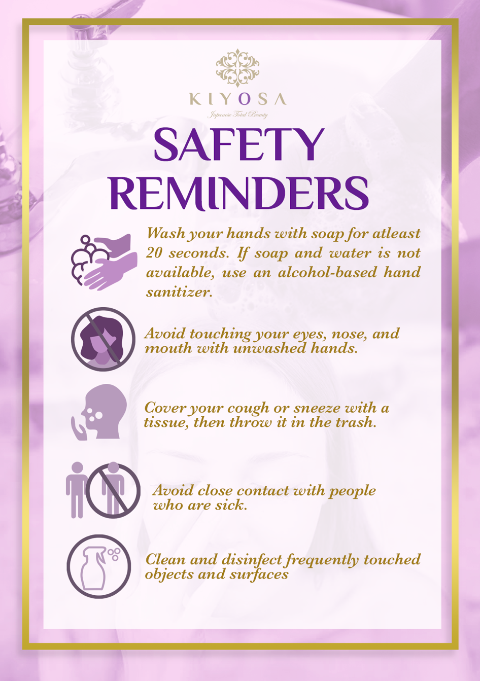
Safety reminders from KIYOSA Japanese Total Beauty
What to do if I have the symptoms of the coronavirus?
First of all, DON’T PANIC! You might have the symptoms, but it doesn’t necessarily mean it is caused by novel coronavirus. If you have a fever, cough and difficulty breathing, be sure to seek medical care immediately and let the doctors know about your previous travel history to let them know if you have been in places where you might have contracted the virus.
Since it is a new type of coronavirus, 2019-nCoV still has no vaccine or specific treatment yet. However, the symptoms can be treated based on the person’s condition.
What is the status of the 2019-nCoV in the Philippines?
As of 4 PM of January 30, 2020, the Department of Health held a press conference announcing the first confirmed case of novel coronavirus in the Philippines: a 38-year-old woman from Wuhan, China who arrived in the Philippines last January 21.
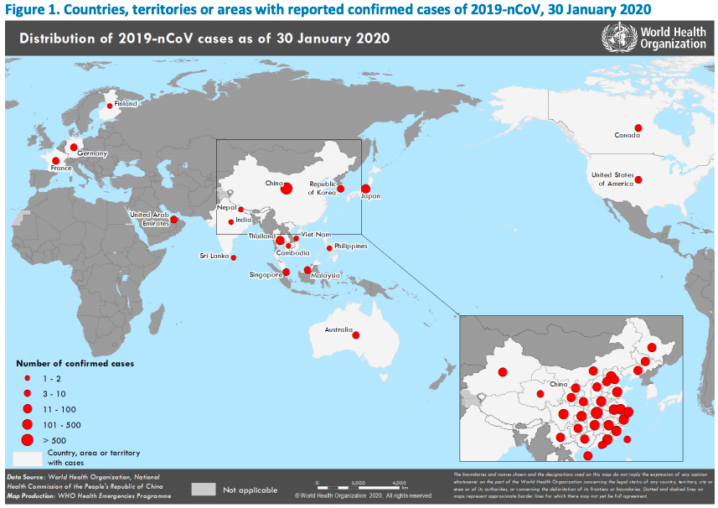
World Health Organization Situation Report on 2019-nCoV as of Jan 30 2020
“I assure the public that the Department of Health is on top of this evolving situation. We were able to detect the first confirmed case because of our strong surveillance system, close coordination with World Health Organization and other national agencies, and the utilization of DOH’s decision tool. We are working closely with the hospital where the patient is admitted and have activated the Incident Command System of the said hospital for appropriate management, specifically on infection control, case management and containment. We are also implementing measures to protect the health staff providing care to these patients,” according to Health Secretary Francisco T. Duque III.
Because of this, health organizations are urging people to be more vigilant and careful by practicing good personal hygiene and adopting healthy lifestyles.
Let us all take care of our bodies not only to avoid this novel coronavirus but also other viral infections as well!

